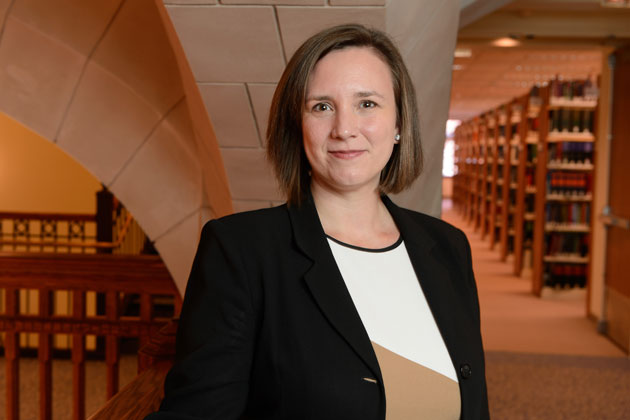
International law and human rights scholar Molly Land joined the UConn faculty in 2013, when she accepted a joint appointment as a professor of law at the Law School and at UConn’s Human Rights Institute in Storrs.
Land has both expertise in human rights and background as an intellectual property litigator. Her scholarship focuses on the effect of new technologies on human rights fact-finding, advocacy, and enforcement, as well as the role of human rights norms and framing strategies in organizing around human rights issues.
Her current work explores the extent to which human rights law can provide a foundation for claims of access to the Internet, as well as the opportunities and challenges for using new technologies to achieve human rights objectives.
“Essentially I look at how we can engage in human rights advocacy through the lens of technology,” she says, “[and] how technology might help us investigate – and address – human rights abuses.”
Land was drawn to UConn by the University’s strengths in the field of human rights.
“I saw the posting … and thought it would be a great opportunity and the right next step for me,” says Land, a graduate of Yale Law School who was teaching at New York Law School when she learned of the opportunity at UConn. “While I was in a fabulous center [the Institute for Information Law and Policy at NYLS], the appointment at UConn is enabling me to really focus on the human rights angle, given that there is such a critical mass of faculty at both the Law School and the Human Rights Institute.”
Although Land has long been interested in social justice issues, her interest in addressing those issues through the law didn’t take shape until she was studying at the University of Bonn as a Fulbright Scholar.
“My Fulbright thesis was on the position of Turkish-German immigrants in Germany,” says Land. “When I was working on the paper, I found that the law made a huge difference in terms of whether people felt welcome in the country or not, often in small, surprising ways. … I was very interested in what the law said about citizenship, about belonging, and about our identity as part of a political community. My Fulbright experience really enhanced my interest in law school.”
Professor of Law Molly Land began her clerkship at the U.S. District Court for the Southern District of New York just one week after 9/11. “To see how the legal community pulled together was amazing,” recalls Land. “You had firms sharing space with those who had lost space. It was a tough time to be in New York, but it was also wonderful to see how people came together.”
Energized by a growing interest in the law, Land returned to the U.S. to pursue her JD at Yale, where she focused on international human rights, in large part through her work at the Allard K. Lowenstein International Human Rights Clinic.
“My involvement in the clinic was a transformative experience,” recalls Land, whose assignments included working with Human Rights Watch, as well as a stint in Ecuador researching strategies for litigating economic, social, and cultural rights. “I had always been a bit skeptical about doing human rights work, because it is so often perceived to be about places outside the United States. As a result of my experience at the Lowenstein Clinic, I was taken by the idea that there are these international norms that guarantee minimum living conditions for everyone, everywhere.”
After graduating from Yale, Land deferred her plans to pursue a career in the human rights field in order to clerk for Judge Denise Cote of the U.S. District Court in the Southern District of New York.
“It was one of the best jobs I’ll ever have, I think,” says Land, who is chairing the Clerkship Committee at the UConn Law School. “I not only was mentored by an incredibly accomplished person in the legal field, but I also got to see the court system from the inside. It was an amazing experience.”
Land says that doing human rights work was still very much on her mind during her yearlong clerkship. The next year, 2002-2003, she served as a Robert L. Bernstein Fellow in International Human Rights, a Yale Law School-funded fellowship that took her back to her home state of Minnesota, where she partnered with the Minnesota Advocates for Human Rights on a fact-finding project that looked at the state’s response to domestic violence against immigrant and refugee women.
When not teaching and enjoying a busy family life with her husband, Thomas, a software engineer, and their two young children, Nico and Emily, Molly Land enjoys running. She has competed in the New York Marathon and the Twin Cities Marathon, as well as in two half marathons. “I am more about finishing than running fast,” she says.
With a year of human rights work behind her, Land wanted to try her hand at practice, so she signed on as an associate at Faegre & Benson LLP in Minneapolis, where she represented clients in intellectual property disputes, including a case about chicken processing. After two years in practice, an opportunity to return to Yale as the Allard K. Lowenstein/Robert M. Cover Fellow in International Human Rights and as a visiting lecturer in law drew her back into the human rights arena and set her on a path to be a fulltime academic – a path that took her to New York Law School for six years and now to UConn.
Land is teaching Civil Procedure at the UConn Law School during the fall semester and International Human Rights at both the Law School and the Human Rights Institute in the spring.
“Working with students and advising them about career opportunities in human rights is the greatest job in the world,” she says.


